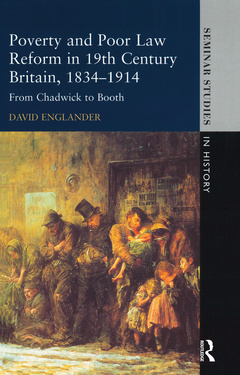Poverty and Poor Law Reform in Nineteenth-Century Britain, 1834-1914 From Chadwick to Booth Seminar Studies Series

The Poor Law Amendment Act of 1834 is one of the most important pieces of social legislation ever enacted. Its principles and the workhouse system dominated attitudes to welfare provision for the next 80 years. This new Seminar Study explores the changing ideas to poverty over this period and assesses current debates on Victorian attitudes to the poor. David Englander reviews the old system of poor relief; he considers how the New Poor Law was enacted and received and looks at how it worked in practice. The chapter on the Scottish experience will be particularly welcomed, as will Dr Englander's discussion of the place of the Poor Law within British history.
PART ONE: THE CONTEXT
1. Introduction.
PART TWO: DESCRIPTIVE ANALYSIS
2. Poor Law Policy in England and Wales
3. Inside the Workhouse.
4. The Poor Laws in Scotland
5. Social Inquiry and Poor Law Reform
PART THREE: ASSESSMENT
6. Problems and Prospects
PART FOUR: DOCUMENTS.
Glossary.
Guide to Main Characters.
Bibliography.
Index.
- Reviews the old system of poor relief before considering the Poor Law Amendment Act of 1834 - one of the most important pieces of social legislation ever enacted.
- Shows how attitudes to poverty changed from being a 'natural' to a `social' condition under the impact of industrialisation, urbanisation and war.
- Contains a detailed examination of what life was really like in the workhouse, from the design of the new establishments, to the food the inmates ate and the problems of discipline.
- Supplemented by a wide range of fascinating primary source material including the Report of the Royal Commission on the Poor Laws, 1834, and moving petitions from the poor themselves.
Date de parution : 02-2015
13.8x21.6 cm
Thème de Poverty and Poor Law Reform in Nineteenth-Century... :
Mots-clés :
Out-door Relief; Poor Law; relief; Late Nineteenth Century Scotland; practices; Poor Law Reform; administration; Unreformed Poor Law; union; Workhouse Medical Officer; policy; Outdoor Relief; outdoor; General Mixed Workhouse; new; Relief Practices; kirk; English Poor Law History; session; Poor Law Board; general; Local Government Board; Poor Relief; Poor Law Administration; Poor Law Amendment Act; Poor Law Unions; Poor Law History; Poor Law Policy; Indoor Relief; Kirk Session; Destitution Authorities; Independent Labourer; Great Famine; School Board Visitors; Defensive Strategy



